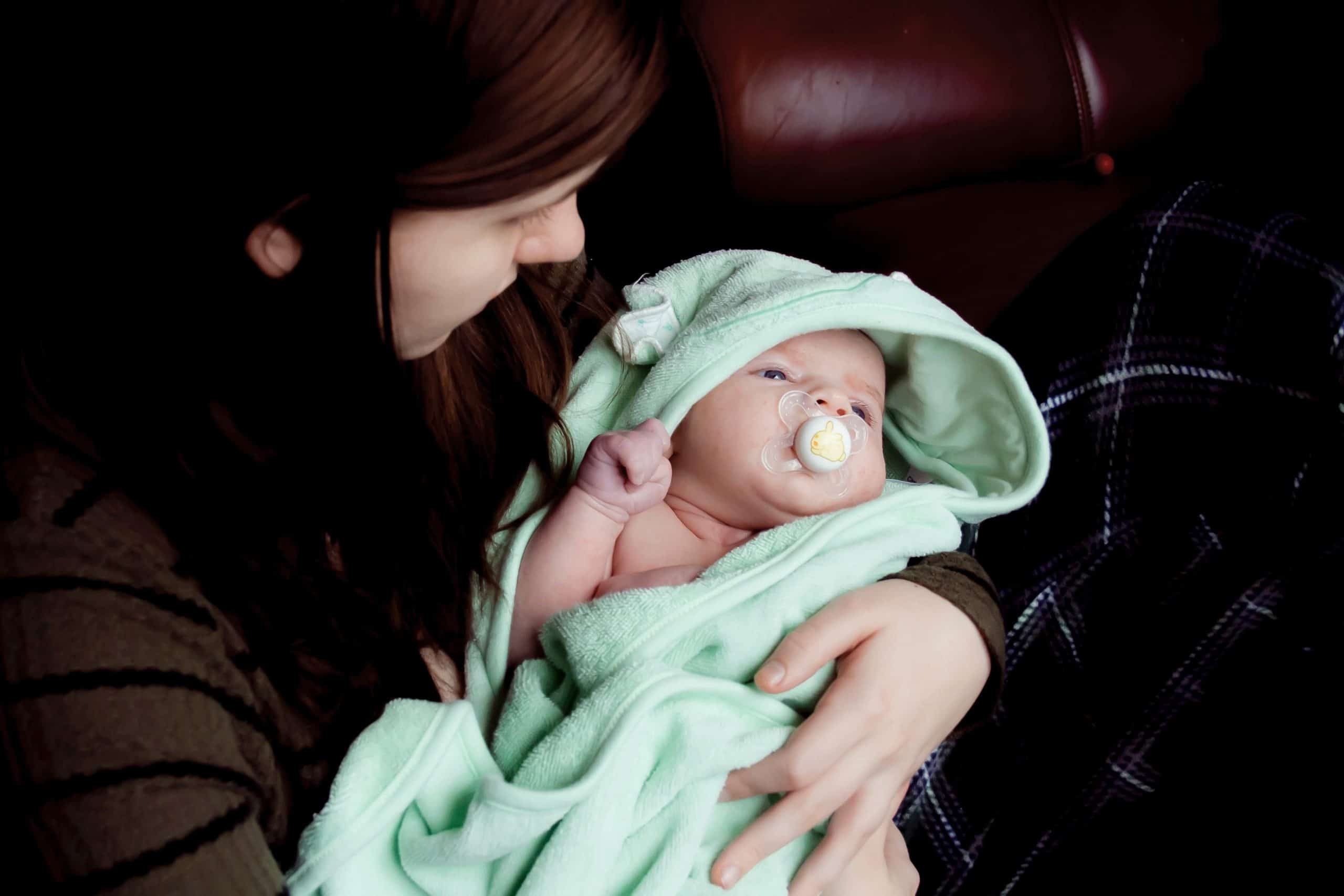

Having a colicky baby can make you feel helpless and like a failure. Why can’t you make your baby feel better?
Lucky for everyone, colic is a phase that eventually goes away, but you need coping strategies and ways to soothe your colicky baby so that everyone can be happy until this phase goes away.
So, let’s dive into what you need to know about how to soothe a colicky baby.
What is Colic?

Before you figure out how to soothe a colicky baby, you have to determine if your baby indeed does have colic. The medical definition of colic is a condition in which babies have inconsolable crying and seems to have abdominal discomfort and pain.
The definition defines colic as crying that extends:
- More than three hours a day
- More than three days a week
- More than three weeks in a baby who is otherwise healthy aside from the crying.
Most people refer to these as the Rule of 3’s, but no matter what you call it, colic is like torture for a new parent and the baby. Colic hits when you’re the most vulnerable and weak, physically, and emotionally. As a parent, you want to be able to soothe your baby, and soothing a colicky baby is ridiculously challenging.
Colic leaves parents feeling inadequate and cheated out of what should be a positive experience for you and your new baby. Take heart; colic isn’t an indicator of your parenting ability. Colic sucks and is rough for everyone.
What Causes Colic?
Doctors have a wide range of theories about what causes colic. Some used to believe that colic was caused by gas, but they aren’t too sure now. Some babies with colic are gassier, but gassiness could be caused by colic instead of the other way around. Excessive crying typically causes babies to intake more air, leading to gassiness.
- It’s just a normal stage that babies go through.
- It’s caused by an imbalance of bacteria in the digestive system.
- An imbalance of melatonin and serotonin changes the chemicals in the brain.
- Some babies have sensitive temperament.
- Other babies have a slower development when it comes to their stress response.
- Some babies need more hands-on attention than they get from their parents.
Signs and Symptoms of Colic

If you aren’t sure if your baby classifies as colic, look for common signs and symptoms of colic. Some of these symptoms aren’t always noticeable to parents, but when you see several of them together, you can be sure that the evidence starts to point to colic.
Not all babies will show these symptoms, and if your baby has one or several of these signs, it doesn’t mean that your baby has colic. The signs and symptoms of colic include:
- Babies are pulling up their legs or extending their legs, which is a sign of abdominal distress.
- Clenching fists
- Passing Gas
- Red face
- Inconsolable during the evening hours
- The crying happens at the same time each day
- Might begin pooping more
- Baby has no reason for the crying.
- Nothing distracts your baby from the crying.
You should note that constipation and colic aren’t linked together. Colic isn’t caused by constipation. So, if your baby is constipated and inconsolable, it has nothing to do with colic.
How Common is Colic?
Colic isn’t some rare issue that most parents never face. It happens in 20 to 25 percent of babies. Don’t believe us? Take a poll of your parent friends, and a surprising number will tell you that their baby had colic as well. It helps you see that you aren’t alone in this journey.
Some doctors speculate that all babies have colic to some degree. However, the parameters for colic as set decades ago, and only 20 to 25 percent of babies fall into that category.
How Long Does Colic Last?

Parents everywhere are thankful that colic doesn’t last forever. Babies start to show signs of colic around a few weeks old, but premature babies might develop colic signs later than full-term babies. Colic starts to improve around three to four months old, but some babies do experience it until six months of age. It varies baby to baby and usually resolves itself within a few weeks or months.
Tips to Soothe a Colicky Baby
So, you know that your baby has colic, but what can you do to help your baby? Here are a few tips to help soothe your baby’s discomfort.
1Reduce Your Dairy Intake
Reduce Your Dairy Intake
For breastfed babies, your baby might be reacting to a milk protein allergy. This allergy or intolerance might cause Their symptoms, and you can ease the reaction by reducing your dairy intake while you breastfeed.
Keeping a journal of what you eat, so that you can see if symptoms come on when you eat something specifically. You need to take at least a few weeks before all of the milk protein is out of your body.
2Change Formula
Change Formula
For formula fed babies, you should speak to your pediatrician to see if changing the formula that you use. Some babies have issues with different formulas, but they handle other varieties just fine.
3Watch How Much Air Your Baby Intakes
Watch How Much Air Your Baby Intakes
Your baby might be swallowing more air than milk when drinking from bottles or with an improper breastfeeding latch. These things can make colic even worse. Gulping air causes gas pain, which is the last thing your colicky baby needs.
4Check for Acid Reflux
Check for Acid Reflux

Have you ever experienced acid reflux during your pregnancy? Acid reflux isn’t fun for adults so you can imagine how it feels for babies. It can make colic even worse, so you need to pay attention to figure out if your baby is suffering from acid reflux or not.
- Coughing
- Extended crying
- Fussy after eating
- Gagging
- Vomiting forcefully and frequently
- Doesn’t want to eat
5Develop a Bedtime Routine
Develop a Bedtime Routine

Babies do well on routines. It helps them know that its time to settle down and go to sleep. Routines make your baby feel safe and calm because they know what happens next.
Developing a bedtime routine takes time, but colicky babies may benefit from simple nightly routines, such as a bath followed by lullabies and being rocked. Now is the time to start developing a routine, but don’t expect it to help immediately.
6Swaddle
Swaddle

Babies are used to being in a snug, warm environment; that describes the womb. That’s how they live their life before they were born, and swaddling recreates that ideal sensation for them. Even if your swaddling skills need to be better, babies appreciate the feeling of the closeness. Practice makes perfect!
You may love to read more about the Best Baby Swaddles to soothe your baby.
7Use a Pacifier
Use a Pacifier

Some parents swear that pacifiers aren’t a good idea, but that’s their opinion. Evidence shows that pacifiers reduce the risk of SIDS and might also help soothe your baby’s colic crying. Sucking is a soothing reflex for babies. They want to suck, which is why babies will comfort nurse at their mother’s breast.
Give a pacifier a try. Dip it in breast milk or formula if your baby doesn’t seem interested.
Learn more about the Best Baby Pacifiers from our in-depth analysis.
8Include a Probiotic in Your Daily Regime
Include a Probiotic in Your Daily Regime
If digestive system problems cause colic, then taking a probiotic in your baby’s daily regime might be a great idea. Talk to your baby’s pediatrician before introducing probiotics, but it’s a relatively safe and straightforward step to try.
Probiotics should be given to your baby daily, just like you would take daily probiotics. Mix the probiotics in with your baby’s formula or breast milk. Powdered probiotics can be rubbed on the inside of your baby’s cheek with a clean finger.
9Babywear
Babywear

When you’re having a rough day and need to get some things done, using a baby sling or carrier is a great trick. Colicky babies love to be held or to have skin to skin contact; it’s one of the best ways to soothe these babies. No one can hold their baby all day, though!
Put on a baby carrier, even if you’re just around the house for the day, and give your arms a break. Your baby is snug and close, but you can clean up, make yourself a meal, or take a walk. It feels good to do something other than snuggling your baby all day, even if cuddling is the best thing.
10Try a Baby Massage
Try a Baby Massage

Belly massages are a favorite for baby’s who might have a belly ache or excess gas. Rubbing his belly can help settle your baby down, making you feel better as well.
Massaging your baby’s belly is simple. Rub his stomach in a circular, clockwise motion. Do this several times a day for several minutes at a time. It might take your baby a few tries to get used to belly massages, but most love it immediately.
11Give Your Baby a Warm Bath
Give Your Baby a Warm Bath

Who doesn’t feel better after a nice, warm bath? A warm bath feels great for a baby who is struggling with colic. It might also be a bit of a change of pace, giving some comfort to babies who won’t stop crying.
If you don’t want to bath your baby, you can try placing a warm bottle against your baby’s stomach. It provides similar, soothing relief. You do have to make sure that it’s not too hot for your baby; it can burn the skin if you make a warm bottle too hot.
12Don’t Overfeed
Don’t Overfeed
Do you know that feeling after you had one too many pieces of pie? You regret it instantly, and your baby can get overfull also. That can be the fault of the parents or caregivers. An overfull stomach is uncomfortable, and parents have to find the difference between giving your baby enough and giving too much.
A few tips to avoid overfeeding your baby include:
- Keep bottles to two to four-ounce increments. That way, you or your caregiver won’t feel as if your baby needs to drink an 8-ounce bottle.
- Use a slower-flow nipple to reduce the drinking speed.
- Learn your baby’s cues. He might push away the bottle or not show any more interest after the bottle is done. Respect those cues to avoid overfeeding.
13Put Baby on His Belly
Put Baby on His Belly

The last tip to soothe your colicky baby is to put him on his belly. Most parents put their baby on his stomach across their lap. This position alleviates discomforts that your baby might be having because of belly discomforts, and it keeps baby in close contact with you.
Coping with a Colicky Baby
Remember that colic is not your fault, and it will end eventually. Until that time, ask for help. No mother can do everything alone; we need help at times. Ask your partner, friends, and family for help to get you through this time.
Use these 13 tips to soothe a colicky baby, take a few hours away for yourself, and prepare for the rough evenings ahead mentally. Colic doesn’t last forever, and parents everywhere are thankful for that.






